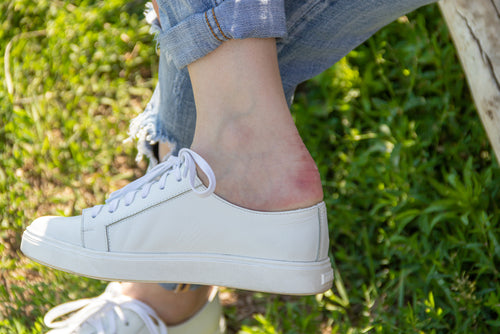Whether you're an avid hiker, a frequent traveler, or simply someone who spends a lot of time on their feet, blisters can be a painful and frustrating problem. These small fluid-filled bubbles that form on the skin can cause significant discomfort and even impair mobility. In this blog post, we'll explore a surprising potential solution to this common issue: using antiperspirant on your feet. We'll examine the science behind this method, its effectiveness, and other strategies for maintaining optimal foot health and comfort.
The Science Behind Antiperspirants and Blisters
Blisters typically form when the skin experiences constant friction, often exacerbated by moisture. Antiperspirants work by creating a protective barrier on the skin that reduces both wetness and friction - the two main culprits behind blister formation. But how effective is this method?Several studies have investigated the use of antiperspirants for blister prevention:
- A study conducted by the National Institutes of Health (NIH) on soldiers found that using a specialized heavy-duty antiperspirant significantly decreased the incidence of foot blisters.
- Another study involving 667 military cadets showed that those who used an antiperspirant (20% aluminum chloride hexahydrate in anhydrous ethyl alcohol) for at least three nights before a 21-km hike had a 21% incidence of foot blisters, compared to 48% in the placebo group.
- Research on 19 male soldiers demonstrated that antiperspirants containing aluminum chlorohydrate and aluminum zirconium tetrachlorohydrex glycine decreased foot-sweat accumulation by over 50%.
These findings suggest that antiperspirants can indeed be effective in reducing foot sweat and, consequently, the likelihood of blister formation.
Pros and Cons of Using Antiperspirants on Feet
While the potential benefits are clear, it's important to consider both the advantages and drawbacks of this method:
Pros:
- Can significantly reduce foot sweat and blister incidence
- Easy to apply and widely available
- May improve overall foot comfort during physical activities
Cons:
- Effectiveness varies (approximately 20% reduction in blister occurrence)
- High incidence of skin irritation (57% of users in one study)
- May not be suitable for all skin types
Best Practices for Blister Prevention
While antiperspirants can be helpful, a comprehensive approach to blister prevention is recommended:
- Choose the right socks: Opt for moisture-wicking, cushioned socks that reduce friction and keep feet dry.
- Ensure proper shoe fit: Ill-fitting shoes are a major cause of blisters. Make sure your shoes fit correctly and don't have rough edges that can rub against your skin.
- Use orthotics: Insert cushioned orthotics to add extra padding and reduce friction in problem areas.
- Pre-treat potential hot spots: Apply silicone tape or blister bandages to areas prone to rubbing before activities.
- Consider antiperspirants: If you decide to try this method, use an antiperspirant formulated for feet and test it on a small area first to check for skin irritation.
- Keep feet dry: Change socks frequently if your feet tend to sweat excessively.
- Gradually break in new shoes: Don't wear new shoes for extended periods right away; break them in gradually to reduce the risk of blisters.
When to Be Concerned About Blisters
While most blisters heal on their own once the source of friction is eliminated, it's important to monitor them. Burst blisters can become infected, potentially leading to more serious health issues requiring antibiotic treatment. If you notice signs of infection such as increased pain, redness, warmth, or pus, consult a healthcare professional.
Conclusion
Using antiperspirants on your feet can be an effective strategy for preventing blisters, especially when combined with other preventive measures. However, it's not a one-size-fits-all solution, and the potential for skin irritation should be considered. By implementing a comprehensive approach to foot care, including proper footwear, moisture management, and targeted prevention techniques, you can significantly reduce your risk of developing painful blisters and enjoy improved foot health and comfort during your activities.Remember, your feet carry you through life, so taking good care of them is essential for maintaining an active and enjoyable lifestyle. If you continue to experience persistent foot problems despite these preventive measures, consider consulting a podiatrist or foot care specialist for personalized advice and treatment options

